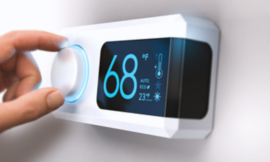Don’t just cool—Control Humidity Levels with Smart ACs for a perfectly balanced home climate that enhances comfort and keeps energy bills down.

Ever wondered how smart air conditioning could transform your home’s comfort and air quality? In cities like Mumbai, Delhi, and Bangalore, where humidity is a significant concern, smart ACs are changing the way we manage our indoor environment.
These boxes not only cool the air but also control humidity levels with smart ACs, ensuring a more comfortable and healthier smart home.
Environmental bloggers and eco-friendly stars are all into smart air conditioning for better home comfort. These systems don’t just control the temperature. They also help with monitoring humidity and improving indoor air quality.
Smart ACs are made to deal with India’s climate challenges. They control humidity levels precisely, ensuring comfort and saving energy. This tech is great in places where moisture changes a lot during the year.
In India, it is crucial to monitor and control humidity levels throughout the year to ensure comfort, health, and energy efficiency. Different seasons present varying challenges:
- Summer: High temperatures and moderate to high humidity can lead to discomfort and increased AC usage. It is important to monitor and control humidity levels to maintain indoor comfort and reduce energy consumption.
- Monsoon: Humidity levels often exceed 70%, which can promote mould growth, aggravate respiratory conditions, and strain air conditioning systems. Using smart ACs to monitor and control humidity levels can significantly enhance indoor air quality and energy efficiency.
- Winter: In some regions, lower humidity can cause dryness in the air, leading to respiratory discomfort and skin issues. While smart ACs can help maintain ideal humidity, it’s also important to use humidifiers in very dry conditions.
| Season | Ideal Humidity Range | Impact of Deviation | Recommendation |
| Summer | 30%–50% | Discomfort, higher AC usage | Monitor and control humidity levels to save energy |
| Monsoon | 50% – 70%+ | Mold growth, respiratory issues, increased energy consumption | Use Smart ACs to monitor and control humidity levels |
| Winter | 30% – 40% | Dryness, respiratory discomfort | Use humidifiers in addition to monitoring humidity |
By carefully monitoring and controlling humidity levels across all seasons, homeowners in India can not only enhance indoor comfort but also improve energy efficiency and health outcomes.
Key Takeaways
- Smart AC systems effectively manage humidity and temperature
- Improved indoor air quality through advanced filtration
- Energy-efficient operation leads to cost savings
- Remote control via smartphone apps for convenience
- Integration with smart home ecosystems for seamless automation
- Customisable settings for personalised comfort
- Regular maintenance ensures optimal performance
Understanding the Importance of Humidity Control in Indoor Spaces
Keeping the right humidity levels inside is key for comfort, health, and keeping our homes in good shape. We’ll look at how humidity affects our living spaces and what levels are best for good air quality.
The impact of humidity on comfort and health
Humidity greatly changes how we feel the temperature and impacts our health. Tools like humidity sensors and hygrometers are crucial for keeping the air quality right. They help us stay comfortable indoors.
Too much humidity makes rooms feel hot and stuffy. On the other hand, too little humidity can dry out our skin, irritate our eyes, and affect our breathing. It’s important to control humidity to keep our living spaces healthy.
Ideal indoor humidity levels for optimal air quality
The Environmental Protection Agency suggests keeping humidity between 30% and 50% inside. This stops moisture problems and helps with cooling. In winter, go for 25% to 40% humidity, and in summer, aim for 40% to 50%.
| Season | Ideal Humidity Range |
|---|---|
| Winter | 25% – 40% |
| Summer | 40% – 50% |
Effects of unsuitable humidity levels on home and health
Too much humidity (over 60%) can cause mould and pests and harm furniture and gadgets. It might also make HVAC systems work too hard, using more energy. Low humidity (under 30%) can lead to static shock, wood cracking, and more colds and flu.
To fix these problems, think about using smart HVAC systems and automated climate control. These technologies can keep humidity at the right levels. This makes our homes healthier and more comfortable.
Smart AC Systems: The Future of Humidity Management
Smart AC systems are changing how we control our indoor climate. They have advanced features for managing humidity. This makes them key for keeping air quality and comfort in our homes just right.
Features of smart AC units for humidity control
Today’s smart AC units have the latest tech for controlling moisture and humidity. They use IoT climate control to keep an eye on and adjust humidity levels as needed. This ensures a comfy living space.
- Real-time humidity monitoring
- Automatic humidity regulation
- Intelligent climate control algorithms
- Integration with smart home ecosystems

Benefits of using smart AC for maintaining indoor air quality
Smart AC systems bring many benefits to air quality. They keep humidity levels just right, making your home healthier and more comfortable. Brands like Blue Star and Daikin have features that help improve indoor air quality.
| Benefit | Description |
|---|---|
| Improved air quality | Less allergens and pollutants |
| Energy efficiency | Works better for less energy use |
| Comfort enhancement | Steady temperature and humidity |
| Health benefits | Less risk of breathing problems and mould |
Integration with smart home systems and IoT devices
Connected HVAC systems are leading in smart home tech. They work well with other IoT devices for full home automation and better energy use.
Smart AC systems with IoT integration let you control your home’s climate from anywhere for better energy use.
Using IoT and smart home tech, these advanced AC units give you total control over your indoor environment. They ensure your home is always comfortable and has the best air quality.
Monitor and control humidity levels with smart AC units.
Smart AC units have changed how we handle indoor humidity. They come with built-in humidity sensors for precise control. This ensures your home stays comfortable and has clean air. Keeping humidity between 30% and 50% stops mould and helps with breathing.
Many smart thermostats now have features for managing humidity. For example, the Protium Temperature and Humidity Monitor let you track humidity in real time. It works with your system for better control.
Voice-controlled air conditioning makes managing humidity easy. Just tell your smart assistant to adjust the moisture, and your AC will do it. This is great for those who have trouble moving or are busy.
- Change your AC filter every month to stop moisture in ducts
- Have your HVAC checked once a year to find problems early
- Set your AC to 2-3°C lower to cut humidity without getting too cold
- Use the ‘Dry Mode’ for saving energy and controlling humidity
- Check humidity levels often to see how your AC is doing
Smart ACs let you set different comfort levels for different times or seasons. This keeps your home just right all year, adjusting for summer and winter.
Being able to control humidity from your phone is a big plus. With an app, you can check and change your home’s humidity even when you’re out. This is great for stopping mould when you’re away for a while.
“Smart AC technology has made keeping the right humidity levels easy. It’s not just about feeling good; it’s about living healthier.”
Using these smart features and keeping up with HVAC care keeps your home at the ideal humidity. This supports both your comfort and health. Remember, picking an energy-efficient smart AC is key to saving money and being green.
Setting Up Your Smart AC for Effective Humidity Control
Choosing and setting up a smart air conditioner for humidity control is important. We’ll help you pick, install, and set up your smart AC for the best air quality indoors.
Choosing the right smart AC unit for your space
When picking a smart air conditioner, think about your room size and energy efficiency. Choose units with built-in humidity sensors and hygrometer integration for better control. Smart ACs with air purification can also improve your air quality.
Installation and configuration tips
Installing a smart AC needs careful planning. Place the unit for the best airflow and humidity control. Set the humidity levels based on your area’s climate and what you prefer. Most smart ACs let you set humidity levels between 30% and 50%.
| Installation Step | Key Considerations |
|---|---|
| Unit Placement | Ensure proper airflow and accessibility |
| Power Connection | Use a dedicated circuit for safety |
| Sensor Calibration | Follow manufacturer guidelines for accuracy |
| App Setup | Download and configure the companion app |
Connecting your smart AC to home automation systems
Link your smart AC with your home automation for full climate control. Connect it to your Wi-Fi and pair it with other IoT devices. This lets you control it from your phone or voice assistant.
By following these steps, you’ll get a smart AC system that keeps humidity levels right. This ensures your home has the best air quality and comfort.
Optimising Smart AC Performance for Humidity Regulation
Smart climate control systems have changed how we handle indoor air quality. To make the most of your intelligent thermostat and smart AC for humidity control, here are some tips:

Keeping your AC in good shape is key. Clean or swap out air filters every month to keep airflow smooth and efficient. This easy step can greatly boost your AC’s ability to control humidity.
Use your smart AC’s dry mode or dehumidification settings when humidity is high. These options are made for automated dehumidification. They keep your space comfortable without making it too cold.
Set the fan to ‘auto’ mode for better condensation drainage. This setting stops too much moisture from getting back into your home. It helps with whole-house humidity control.
Make the most of smart features like scheduling and geofencing. These IoT tools let you change humidity levels based on when you’re home and the time of day. This makes your home more comfortable and saves energy.
| Smart AC Feature | Benefits of Humidity Control |
|---|---|
| Dry Mode | Removes excess moisture without overcooling |
| Auto Fan | Ensures proper condensation drainage |
| Scheduling | Adjusts humidity based on daily routines |
| Geofencing | Optimises settings based on occupancy |
For better air quality, think about adding an air purifier like the Dyson Pure Cool Link to your smart AC. This combo can handle humidity and air pollutants well. It makes your indoor air healthier.
Check and look at humidity data through your AC’s app often. This info helps you adjust settings for the best comfort and energy use. It makes sure your smart climate control works well.
Complementary Methods to Enhance Humidity Control
Smart AC systems are great for managing indoor humidity. But, using them with other methods can make things even better. Let’s look at some ways to improve your home’s air quality and comfort.
Natural Ways to Manage Humidity Levels
Improving ventilation is a simple way to control humidity. Open windows or use fans to move air around and cut down moisture. Some plants, like spider plants and peace lilies, soak up extra humidity. Putting water bowls or baking soda in damp spots can also help balance moisture.
Using Dehumidifiers and Humidifiers with Smart AC
A dehumidifier is great with your smart AC to tackle too much moisture. For dry air, a humidifier can add moisture. Smart AC apps let you check and adjust humidity for the best comfort.
The Role of Proper Ventilation in Humidity Management
Good ventilation is key for indoor humidity control. Use exhaust fans in kitchens and bathrooms to take out moist air. Fixing things like leaky pipes or indoor laundry drying can also help control humidity.
| Method | Benefit | Energy Efficiency |
|---|---|---|
| Smart AC | Precise control, data analysis | High |
| Dehumidifier | Removes excess moisture | Moderate |
| Humidifier | Adds moisture in dry conditions | Moderate |
| Natural Ventilation | Improves air circulation | Very High |
Using these methods with your smart AC can get humidity levels just right. It also boosts energy efficiency and makes your home healthier and more comfortable. Remember, the best humidity level is between 30% and 60% for good air quality and comfort.
FAQ: Monitor and Control Humidity Levels with Smart AC
What is the AC unit that controls humidity?
A dehumidifier AC unit is specifically designed to control humidity levels in addition to cooling the air. It works by removing excess moisture from the air, making it more comfortable and preventing potential damage caused by high humidity.
Which AC is best for humidity?
The best AC for humidity control depends on your specific needs and the size of your space. Dehumidifier AC units are generally the most effective option for managing humidity. Look for models with a dedicated dehumidification mode and adjustable humidity settings.
Does AC have a humidity sensor?
Many modern AC units, especially smart AC models, have built-in humidity sensors. These sensors help the AC accurately measure the humidity level in the room and adjust its dehumidification settings accordingly.
How do you control humidity with an air conditioner?
To control humidity with an air conditioner, you can:
- Use the dehumidification mode: If your AC has this feature, activate it to remove excess moisture from the air.
- Adjust the fan speed: A higher fan speed can help circulate the air and reduce humidity.
- Close windows and doors: This prevents outside humidity from entering the room.
- Use a dehumidifier: If your AC doesn’t have a strong dehumidification feature, consider using a standalone dehumidifier.
How do you check the humidity in an air-conditioned room?
You can use a hygrometer to measure the humidity level in your room. These devices are available in various forms, including digital and analogue models.
How can you effectively monitor and control humidity levels with a smart AC to improve indoor air quality?
A smart AC can effectively monitor and control humidity levels by:
- Real-time monitoring: Built-in sensors continuously track humidity levels.
- Automatic adjustments: The AC can automatically adjust its dehumidification settings based on the measured humidity.
- Remote control: You can monitor and control humidity levels from your smartphone or other devices.
- Energy efficiency: Smart ACs can optimize their operation to reduce energy consumption while maintaining optimal humidity levels.
What are the benefits of using a smart AC to monitor and control humidity levels in your home?
Using a smart AC to control humidity offers several benefits, including:
- Improved comfort: A well-controlled humidity level can make your home more comfortable.
- Health benefits: High humidity can contribute to mould growth and respiratory problems. Maintaining a healthy humidity level can improve indoor air quality and your well-being.
- Property protection: Excess humidity can lead to damage to furniture, electronics, and building materials. By controlling humidity, you can protect your property.
- Energy efficiency: Smart ACs can optimize their operation to reduce energy consumption.
Can a Smart AC automatically monitor and control humidity levels, and how does it impact energy efficiency?
Yes, a smart AC can automatically monitor and control humidity levels. This feature is often combined with other energy-saving technologies, such as intelligent temperature control and scheduling. By optimizing its operation based on real-time conditions, a smart AC can help reduce energy consumption while maintaining a comfortable indoor environment.
Conclusion
Monitoring and controlling humidity with a smart AC unit is key to a healthy living space in India. These systems help improve indoor air quality, tackling the challenges of our varied climate. They make our homes more comfortable and healthier for us and our families.
The smart HVAC control market is growing fast and is expected to jump from $9.67 billion in 2022 to $17.89 billion by 2028. This shows how smart AC systems are becoming vital for managing humidity efficiently. HVAC systems are essential for keeping our indoor environment right, and smart technology makes them work better.
Smart AC units use advanced algorithms and sensors to save energy and work with IoT platforms. This lets us get detailed insights to adjust our climate for better comfort and health. In India’s different climates, from humid coasts to dry interiors, these systems are very useful.
Using smart AC technology for humidity control helps us live healthier and more comfortably while saving energy. Smart ACs can be controlled from our phones, giving us easy and precise control over our indoor climate. By choosing these smart solutions, we’re not just making our homes better; we’re also helping the planet and our future.


